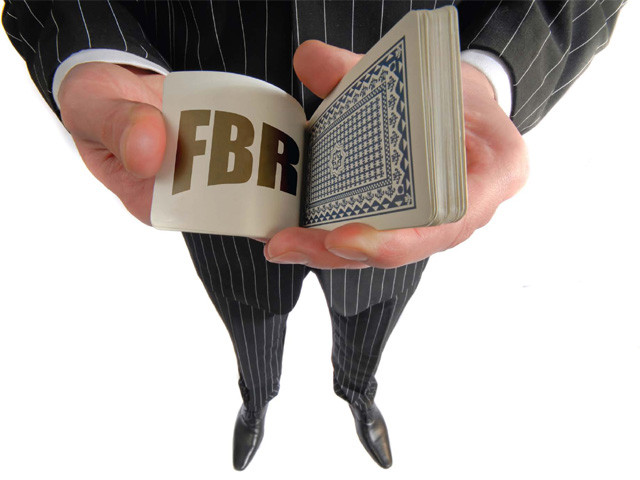Incentive to pay: Amnesty scheme help FBR register 22% increase in revenues
Owners of smuggled vehicles, tax-dodging textile mills avail option to pay lower taxes.

FBR collected Rs182.2 billion in March – Rs32.6 billion or 21.8% higher over the same month last year. ILLUSTRATION: S.JAMAL
The state’s revenues in March grew 22% for the first time in nine months, following tax authorities’ decision to extend an amnesty on smuggled vehicles and a crackdown on influential textile millers who have so far been evading sales taxes.
The Federal Board of Revenue (FBR) collected Rs182.2 billion in March – Rs32.6 billion or 21.8% higher over the same month last year – according to provisional data on collection efforts. The FBR has said the final collection figure will be close to Rs193 billion after book adjustments.
Of the Rs32.6 billion additional revenues collected last month, Rs9.4 billion were coughed up by owners of smuggled vehicles, while Rs2.8 billion came from textile millers who had so far been evading taxes by cooking their books to get undue relief in paying taxes.
The amount collected during the month does not include Rs8 billion owed by the National Bank of Pakistan and the Habib Bank to the national kitty. Both banks had obtained stay orders from higher courts after tax authorities pointed that National Bank owed Rs5 billion in different liabilities to the exchequer, while Habib Bank owed Rs3 billion. The two banks and the FBR had reached an out of court settlement, but the former had not deposited the amounts due before the close of last month, FBR officials said.

The previous regime had set a Rs2.381 trillion tax target for the current fiscal year, which required 26% growth in revenue collection. However, that growth has remained sluggish due to a slowdown of economic activity, tax breaks granted to influential lobbies, and rampant corruption.
Authorities plan to meet the shortfall by either levying more taxes or offering an amnesty scheme to recover up to Rs120 billion from three million identified tax evaders. The plan to introduce a tax amnesty scheme has so far met with stiff resistance.
Amnesty schemes
Under the amnesty scheme on smuggled vehicles, the FBR has so far legalised over 34,000 automobiles. It has also extended the scheme till April 6, aiming to milk a few billion more from owners of smuggled cars. The authority has incentivised the registry of smuggled vehicles via payment of nominal amounts of customs duties. Currently, 150-200,000 non-custom paid vehicles are plying the roads, which also pose a serious security threat.
Federal Tax Ombudsman (FTO) Shoaib Suddle has objected to the scheme and sought details from all five Regional Tax Offices of the FBR – a move that has not gone down well at the FBR. FBR officials have complained that the FTO is unnecessarily interfering in the FBR’s working. They said the FBR would not provide the data to the FTO except in cases where the FTO has concrete information of misuse of the scheme.
Suddle had taken notice on suspicions that the scheme has opened the doors to the influx of more smuggled vehicles in the country – an accusation that the FBR is not willing to accept.
Tax authorities have also registered FIRs against owners of textile mills for evading taxes. Following punitive measures, influential millers have so far deposited Rs2.8 billion in the kitty, FBR Chairman Ali Arshad Hakeem revealed.
He said the FBR has given 15 more days to such persons to clear all outstanding dues. After expiry of the deadline, the FBR will not hesitate in arresting culprits, Hakeem warned.
After that announcement, the well-connected textile lobby has reportedly approached President Asif Ali Zardari to intervene. Sources said one Karachi-based billionaire refuses to pay any taxes and has instead opted to approach all quarters that can be of help in this regard.
Hakeem says revenue generation cannot improve until some bold steps are taken, as economic activity has slowed down in the country. “This is evident from the fact that revenue collection at imports stage is constantly going down,” he observed.
Published in The Express Tribune, April 3rd, 2013.
Like Business on Facebook to stay informed and join in the conversation.



















COMMENTS
Comments are moderated and generally will be posted if they are on-topic and not abusive.
For more information, please see our Comments FAQ